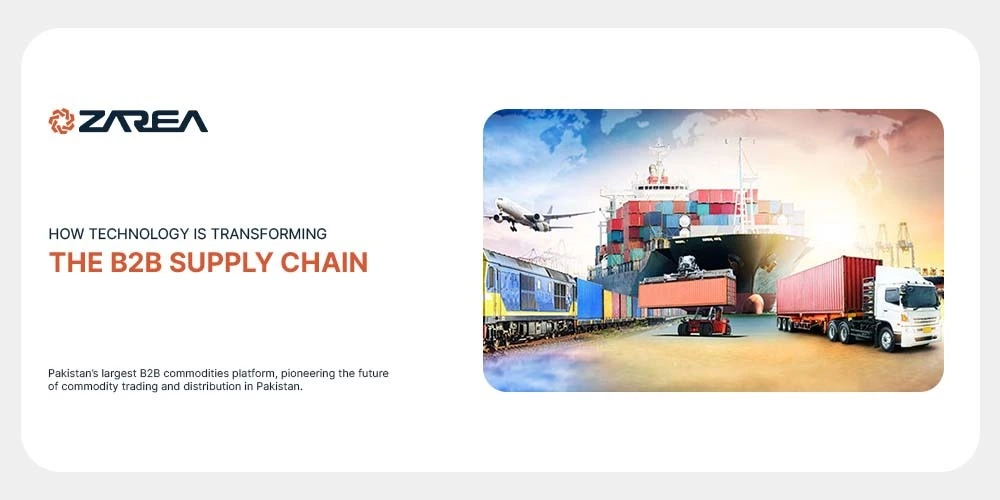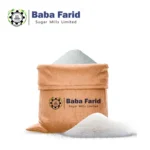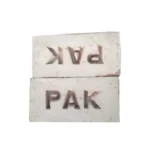Introduction – B2B Supply Chain:
The B2B supply chain in the commodities and construction sectors is changing dramatically in an era where innovation is transforming established businesses. Technology-driven platforms are redefining every aspect of the supply chain, from payments and inventories to procurement and shipping. Modernising the supply chain is not only increasing efficiency in Pakistan and other developing countries, but it is also encouraging speed, sustainability, and openness in corporate operations.
This blog examines how platforms like Zarea are driving this transition and how technology is transforming the B2B supply chain, particularly in the commodities and construction industries.
The Conventional Supply Chain – Manual and Disjointed:
Historically, laborious procedures, disjointed networks, and opaque pricing mechanisms have defined the B2B supply chain in commodities and construction. Buyers and sellers used hardcopy catalogues, phone-based negotiations, and intermediaries. This often led to:
- Lack of transparency
- Inefficiencies in procurement
- Frequent stockouts or overstocking
- Limited access to quality suppliers
Such bottlenecks hinder growth, inflate costs, and affect project timelines—especially for large-scale construction and infrastructure development.
Technology as a Revolutionary Tool:
B2B interactions are becoming more efficient across the supply chain as a result of the integration of digital platforms, data analytics, artificial intelligence, and cloud computing. Here’s how:
1. Digital Marketplaces and Platforms
Online B2B platforms like Zarea are replacing traditional dealer networks by connecting manufacturers, distributors, and bulk buyers on a single unified platform. These platforms:
- Offer real-time product availability
- Provide transparent pricing
- Enable bulk ordering and logistics tracking
- Build trust with verified suppliers
For construction and commodity buyers, this means faster procurement, better pricing, and reduced dependency on middlemen.
2. AI-Powered Demand Forecasting
Artificial Intelligence (AI) is transforming how businesses predict demand. By analyzing historical sales, market trends, and project schedules, AI tools help:
- Optimize inventory levels
- Avoid shortages and excess
- Reduce warehousing costs
In the construction industry, where timelines are crucial, such forecasting is vital to prevent material delays.
3. Blockchain for Traceability and Transparency:
Data traceability and immutability across the supply chain are guaranteed by blockchain technology. This is particularly useful for commodities whose quality is influenced by origin, grade, and handling practices, such chemicals, steel, and cement.
Benefits include:
- Transparent supplier history
- Authentic product certifications
- Fraud prevention in sourcing
By integrating blockchain, B2B platforms are building trust and accountability across stakeholders.
4. Smart Logistics and Fleet Management
Modern B2B supply chains depend on intelligent logistics systems to streamline delivery. With GPS tracking, route optimization, and predictive maintenance, companies can:
- Minimize fuel costs
- Monitor delivery performance
- Ensure timely deliveries to project sites
Digital fleet management tools allow logistics companies to handle high-volume movement of construction goods more effectively.
5. Digital Payments and Financing
Traditional B2B transactions are often hindered by manual invoicing, delayed payments, and lack of credit options. Fintech integration into the B2B supply chain has introduced:
- Instant digital payments
- Credit scoring models
- Trade financing solutions
Buyers can now purchase commodities or construction materials on credit through platform-integrated financing tools—enhancing cash flow management.
The Role of B2B Platforms like Zarea:
In Pakistan, Zarea is pioneering the digital transformation of the B2B supply chain. As the country’s leading online marketplace for construction materials and commodities, Zarea offers:
- A centralized platform to buy grains, bricks, cement, steel, and chemicals
- Verified suppliers and quality assurance
- Custom bulk pricing and supply chain visibility
- End-to-end digital procurement and delivery services
Zarea’s platform is helping merchants, construction companies, and sectors transition from antiquated procurement methods to a more efficient, technologically advanced future.
Case Study – The Evolution of a Construction Company:
Think about a medium-sized construction firm that works on Punjabi infrastructure projects. Their procurement procedure has historically involved manual sourcing, postponed delivery, and erratic prices. After shifting to a digital B2B supply chain platform:
- They achieved 15% cost savings through bulk pricing
- Reduced order-to-delivery time by 30%
- Gained access to automated inventory tracking
- Improved overall project planning and efficiency
This case illustrates the real-world benefits of adopting digital tools in the construction commodity chain.
Challenges and Opportunities:
Challenges:
- Resistance to change in traditional industries
- Limited digital literacy among procurement teams
- Concerns around data privacy and system integration
Opportunities:
- Educating vendors and buyers through digital onboarding
- Leveraging mobile-first platforms for accessibility
- Expanding into rural and underserved regions
With consistent efforts in digital adoption, the B2B supply chain is poised for exponential growth in the coming years.
In summary, the future is Digital:
Technology is now essential for modernising the business-to-business supply chain in the commodities and construction industries. The change is profound and permanent, ranging from AI-powered insights and intelligent finance to digital procurement and real-time tracking.
In addition to bringing consumers and sellers together, platforms such as Zarea are constructing the framework for an industrial ecosystem that is more effective, transparent, and scalable.
The moment has come for any company in the commodities or construction industries to adopt digital supply chain technologies and guarantee your position in a market that is changing quickly.


































